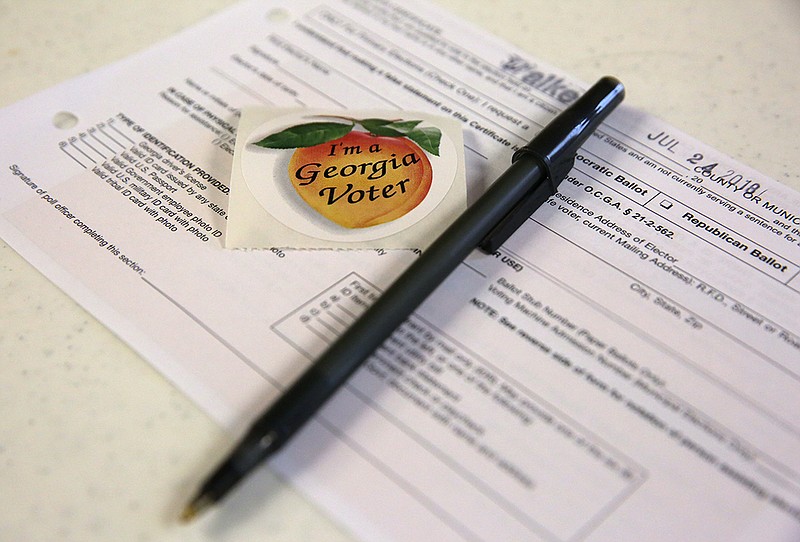Georgia voting rights prevail
In a tiny but significant win for voting rights, a Georgia elections board took less than 60 seconds Friday to vote down a plan that would have closed seven of the nine voting precincts in rural Randolph County ahead of November's midterm elections.
Critics - including this page - decried the plan to consolidate polling places in the majority black county as a brazen attempt to suppress the black vote in Georgia's governor race, which pits former Georgia House minority leader Stacey Abrams, who is black, against Georgia Secretary of State Brian Kemp, who is white.
The entire rural county's population is about 7,000. About 60 percent is black. A consultant - one highly recommended by Kemp's Secretary of State office - wanted the board to leave open only two voting places in the 431-square-mile county with no public transportation. The surface reasoning was because the other seven polling places are not compliant with the Americans with Disabilities Act. In other words, they lack wheelchair ramps and other accommodations.
The American Civil Liberties union told the county the plan would make it "disproportionately harder" for black voters to cast their ballots.
The Lawyers' Committee for Civil Rights Under Law threatened to sue, arguing that closing the polling places over accessibility made little sense: "Forcing elderly, disabled, and other persons with mobility issues to travel lengthy distances to vote is out of place with the purported goal of A.D.A. compliance," the lawyers wrote.
CNN reported Friday that cheers, laughter and applause broke out when the board's meeting was adjourned immediately after a rapid-fire vote.
"We are excited about this moment, but we're watchful," said Edward Dubose, a member of the NAACP's national board of directors. "This is a victory, but by no means should anyone relax. All of this happened under the leadership of Brian Kemp. We need to follow the trail all the way back and search out all of these attempts to set us back in voting rights. This is a small example of what's happening across Georgia to disenfranchise African Americans and minority voters."
Kemp adamantly denies that he was somehow behind the recommendation by the consultant who told Randolph citizens at another meeting that Kemp had asked him to go around the state and "recommend polling place closures" to various counties, according to Slate.com. Closed - not moved. The consultant said he was "not hired to find alternatives."
Ten Georgia counties - all with large black populations - already have taken that same consultant's suggestions and closed polling places, according to Slate. Randolph County fired the consultant last week.
Kemp is well known for his expertise in voter suppression. Since he became secretary of state in 2010, he has initiated investigations of organizations that registered nearly 200,000 new Asian-American and African-American voters, according to The New York Times. His probes mostly have been dropped, yielding no charges, no indictments, no convictions - just years of intimidating investigations, suspects' losing their jobs and Georgia Bureau of Investigation officers knocking on doors.
But more importantly, even after multiple investigations yielded no indication of fraud, thousands of people registered during those drives were not on the voter registration rolls, and a court ruling kept it that way, the Times reported.
Thanks to Kemp and gerrymandered districts drawn by Georgia's Republican-dominated Legislature, whites make up less than 60 percent of Georgia's population, yet 90 percent of Georgians who voted pushed the button on a Republican ballot in the primary. That's some head-scratching math.
How many more rural Georgia county polling places with minority voters are ADA challenged? How many more in any state? Let's make sure everyone in every rural county gets to use their right to vote.
Academic enrichment = guns?
Here's another brainless Republican plan - this one from Secretary of Education Betsy Devos and our federal Department of Education:
Let's allow states to use federal funds - taxpayer money - to buy guns for schools.
What happened to resource officers? What happened to student counselors? What happened to better door locks? What happened to academic needs?
But no, a senior Trump administration official told The Associated Press on Thursday that the agency is "reviewing legislation governing federal academic enrichment grants to see if the money can be used to procure firearms."
Academic enrichment grants = guns? Not in any arithmetic that actually makes sense.
DeVos, who chairs a federal commission on school safety, already has said schools should have the option to arm teachers.
Democratic lawmakers and many educators were rightly outraged by the academic enrichment grants-for-guns idea, noting that the Trump administration could be asking if the grants could instead pay for those much-needed mental health supports, rather than serve the interests of the National Rifle Association by stocking teacher desks with guns.
We think the Democratic leaders are being far too kind.
